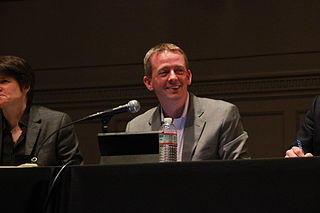A Quote by Michael Pollan
To a very great extent, it's the fast-food industry that really industrialized our agriculture - that drove the system to one variety of chicken grown very quickly in confinement, to the feedlot system for beef, to giant monocultures to grow potatoes. All of those thing flow from the desire of fast-food companies for a perfectly consistent product.
Related Quotes
Those of us who think about what we eat, how it's grown, those of us who care about the environmental impact of food - we've been educated by fabulous books, like Fast Food Nation and documentaries like Food Inc. But despite these and other great projects that shine a critical light on the topic, every year the food industry spends literally tens of millions of dollars to shape the public conversation about our food system.
I think America's food culture is embedded in fast-food culture. And the real question that we have is: How are we going to teach slow-food values in a fast-food world? Of course, it's very, very difficult to do, especially when children have grown up eating fast food and the values that go with that.
I think Americas food culture is embedded in fast-food culture. And the real question that we have is: How are we going to teach slow-food values in a fast-food world? Of course, its very, very difficult to do, especially when children have grown up eating fast food and the values that go with that.
Those externalized costs have always included labor. It is only the decline over time of the minimum wage in real dollars that's made the fast food industry possible, along with feedlot agriculture, pharmaceuticals on the farm, pesticides and regulatory forbearance. All these things are part of the answer to the question: Why is that crap so cheap? Our food is dishonestly priced. One of the ways in which it's dishonestly priced is the fact that people are not paid a living wage to process it, to serve it, to grow it, to slaughter it.
The American fast food diet and the meat eating habits of the wealthy around the world support a world food system that diverts food resources from the hungry. A diet higher in whole grains and legumes and lower in beef and other meat is not just healthier for ourselves but also contributes to changing the world system that feeds some people and leaves others hungry.
If we're eating industrially, if we're letting large corporations, fast food chains, cook our food, we're going to have a huge, industrialized, monoculture agriculture because big likes to buy from big. So I realized, wow, how we cook or whether we cook has a huge bearing on what kind of agriculture we're going to have.
India has the largest number of hungry people. Yet it's an outcome of precisely the same mechanism. It's the control of agriculture that drives down the price it paid for food that it buys from farmers, who are the poorest people. Then you're paying very little for food. You're underpaying the poorest people in any society. Then they're marketing to us the things that are most profitable to them. And those are the things that are packaged and processed and what-have-you. That means you have the simple thing of the explosion of obesity and hunger as a result of capitalism in our food system.






























